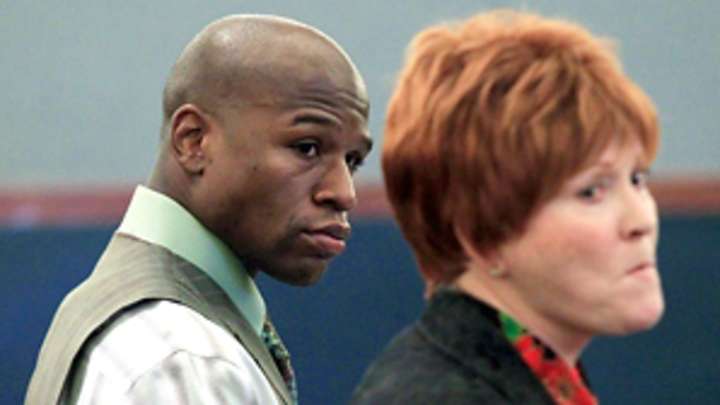Mayweather Jr. accepts plea deal, avoids felony trial but not jail time

The sentence was part of a plea deal between Mayweather and prosecutors in which Mayweather accepted responsibility for his actions and pleaded guilty to misdemeanor domestic violence and harassment charges. Mayweather also agrees to plead no contest to misdemeanor battery in a separate case that involved him hitting a security guard in the face over disputed parking tickets (pleading no contest is similar to a guilty plea, except "no contest" is not an admission of guilt and thus cannot be used by the security guard as an admission should he later sue Mayweather for money damages). Mayweather, whose nickname is "Money" and who is reportedly worth about $100 million, was also fined $2,500 and will be required to perform 100 hours of community service. He will report to jail on Jan. 6, 2012.
Had Mayweather not pleaded guilty, he would have likely faced a felony trial next year. Saragosa was expected to send Mayweather to trial on felony grand larceny, coercion and robbery charges, and misdemeanor domestic battery and harassment counts. Not only could Mayweather have been convicted on the felony charges, but a trial would have impacted his ability to schedule fights. It is expected that Mayweather, who is undefeated at 42-0, will fight Manny Pacquiao next year in what would be one of the biggest draws in boxing history and one that could pay Mayweather in excess of $50 million.
Turning 35 in February, Mayweather is also getting older, and his age may have influenced his decision to plead guilty. Months of his career lost to various court hearings -- as determined by a judge's calendar, and not Mayweather's -- could have prevented him from fully capitalizing on his remaining peak years. Felony trials are also known to take a serious toll on defendants' physical and emotional health, meaning that even if Mayweather was ultimately vindicated in a trial, he may not have returned as the same fighter.
Avoiding a felony trial, and possible conviction, may also help Mayweather advance his legacy as one of the greatest fighters of all time instead of one of the greatest fighters of all time who is also saddled, like Mike Tyson, with a reputation as of the most dubious persons in the sport. Keep in mind, a trial could have been televised nationally and featured damming testimony that portrayed Mayweather as an awful person; Mayweather may have been remembered more for what was said in the trial than for his accomplishments inside the ring.
Mayweather's guilty plea on misdemeanor charges also better positions himself for attracting endorsement deals than if he had been tried and convicted -- few companies want an ex-felon endorsing their goods. Likewise, convicted felon status could have empowered companies with which he currently enjoys endorsement deals to easily void those deals under contractual morals clause language. Mayweather's freedoms as a citizen would also have been impacted had he become a convicted felon. His ability to own firearms, travel abroad and, in some states, vote would have all been restricted.
While Mayweather emerges as a winner in most regards from Wednesday's sentencing, advocates for victims of domestic violence have reason to question why Mayweather could receive such a light sentence for what appears to have been a grotesque and cowardly incident. Remember the details of what allegedly happened. Prosecutors claimed that while in an argument with his ex-girlfriend, Josie Harris, Mayweather -- a professional boxer -- grabbed her, pulled her hair and then heaved her to the floor. He also allegedly threatened to kill her, as their young children, Koraun and Zion, watched and were warned by Mayweather to not say anything. Put mildly, the confrontation seems frightening and a sign of terrible judgment on Mayweather's part. Although the lack of a trial means that a full factual record will not be developed and although Mayweather may have been vindicated in a trial, the fact that Mayweather pleaded guilty to charges relating to the incident corroborates the underlying allegations against him.
Prosecutors' willingness to allow Mayweather to plead guilty to misdemeanor charges could reflect limitations to their case. R. Michael Cassidy, a criminal law professor at Boston College Law School and former prosecutor, tells SI.com of the possibility that key witnesses, such as Harris or the two children, may not have wanted to testify against Mayweather. In addition, the quality of evidence implicating Mayweather and other available means of proof may not have been strong as they appear.
Still, Mayweather is not a first time offender of these types of charges. Back in 2002, he pleaded guilty and received a suspended sentence and house arrest on domestic violence charges, and in 2004 pleaded guilty to charges relating to a physical confrontation with two women in a nightclub. Will he have finally learned his lesson this time around, after less than a few months in jail? That remains to be seen.

Michael McCann is a legal analyst and writer for Sports Illustrated and the founding director of the Sports and Entertainment Law Institute (SELI) at the University of New Hampshire School of Law, where he is also a tenured professor of law.